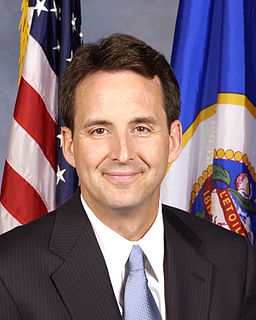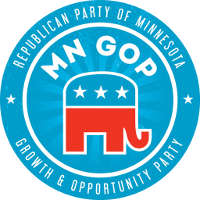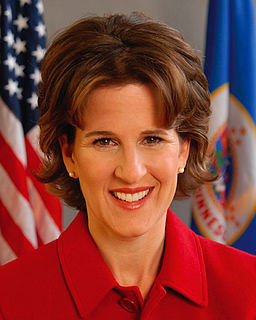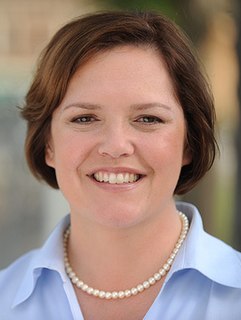
Arne Helge Carlson is an American politician who served as the 37th Governor of Minnesota.

Timothy James Pawlenty is an American businessman and politician who is president and CEO of Financial Services Roundtable, a Washington, D.C.-based industry advocacy group. He was a Republican politician who served as the 39th Governor of Minnesota (2003–2011). He previously served in the Minnesota House of Representatives (1993–2003), where he was majority leader for two terms. In 2011, he entered the campaign for the Republican presidential nomination and later was a potential vice presidential nominee before serving as co-chair of Mitt Romney's campaign.

Mark Brandt Dayton is an American politician who served as the 40th governor of Minnesota from 2011 to 2019. He was a United States Senator for Minnesota from 2001 to 2007, and the Minnesota State Auditor from 1991 to 1995. He is a member of the Minnesota Democratic–Farmer–Labor Party (DFL), which affiliates with the national Democratic Party.

The Republican Party of Minnesota is a conservative political party in the U.S. state of Minnesota. It is affiliated with the United States Republican Party.

The Minnesota Legislature is the bicameral legislature of the U.S. state of Minnesota consisting of two houses: the Senate and the House of Representatives. Senators are elected from 67 single-member districts. In order to account for decennial redistricting, members run for one two-year term and two four-year terms each decade. They are elected for four-year terms in years ending in 2 and 6, and for two-year terms in years ending in 0. Representatives are elected for two-year terms from 134 single-member districts formed by dividing the 67 senate districts in half.
Government shutdowns, in United States politics, refer to a funding gap period that causes a full or partial shutdown of federal government operations and agencies. They are caused when there is a failure to pass a funding legislation to finance the government for its next fiscal year and/or a temporary funding measure, and primarily occurs when there is a disagreement over a proposed spending bill within the United States government. Ever since a 1980 interpretation of the 1884 Antideficiency Act, a “lapse of appropriation” due to a political impasse on proposed appropriation bills requires that the US federal government curtail agency activities and services, close down non-essential operations, furlough non-essential workers, and only retain essential employees in departments covering the safety of human life and/or protection of property. Voluntary services in these respective essential areas may only be accepted during emergencies.

The 2006 Minnesota gubernatorial election took place on November 7, 2006. Incumbent Tim Pawlenty was endorsed by the state Republican convention on June 2, 2006, while the state Democratic–Farmer–Labor convention endorsed Mike Hatch on June 10, 2006. The party primaries took place on September 12, 2006, with Hatch defeating DFL challengers Becky Lourey and Ole Savior and incumbent Pawlenty defeating Sue Jeffers. In the November 7 general election Pawlenty received a plurality of the votes, defeating Hatch by a margin of one percent. It was the most recent time a Republican was elected governor of Minnesota.

Rebecca Otto is an American politician who served as State Auditor of Minnesota from 2007 to 2019. Affiliated with the Minnesota Democratic-Farmer-Labor Party (DFL), she served in the Minnesota House of Representatives from 2003 to 2005 and on the Forest Lake School Board.

Margaret Anderson Kelliher is an American politician, current Commissioner of the Minnesota Department of Transportation, and a former member of the Minnesota House of Representatives. A member of the Minnesota Democratic–Farmer–Labor Party, she represented District 60A, which includes portions of the city of Minneapolis in Hennepin County, located in the Twin Cities metropolitan area. First elected in 1999, she served until 2011, also serving as the Speaker from 2007 to 2011. She is the second woman to hold the position of House speaker. She was an unsuccessful candidate for the DFL nomination for Governor of Minnesota in the 2010 gubernatorial election, losing to former Senator Mark Dayton. On June 5, 2018, she registered as a candidate for the DFL nomination to the U.S. House of Representatives in Minnesota's 5th congressional district.

Minnesota is known for a politically active citizenry, with populism being a longstanding force among the state's political parties. Minnesota has consistently high voter turnout; in the 2008 U.S. presidential election, 77.8% of eligible Minnesotans voted – the highest percentage of any U.S. state or territory – versus the national average of 61.7%. This was due in part to its same day voter registration laws; previously unregistered voters can register on election day, at their polls, with evidence of residency.

The eighty-fourth Minnesota Legislature first convened on January 4, 2005. The 67 members of the Minnesota Senate were elected during the General Election on November 5, 2002, while the 134 members of the Minnesota House of Representatives were elected during the General Election on November 2, 2004.
John Hottinger is a Minnesota attorney and politician and a former member and majority leader of the Minnesota Senate. First elected in 1990, he was re-elected in 1992, 1996, 2000 and 2002. A Democrat, he represented the old District 24 prior to the 2002 redistricting, and the current District 23 thereafter. The district included portions of Blue Earth, Le Sueur, Nicollet, Sibley and Waseca counties in the south central part of the state.

The 2011 Minnesota state government shutdown was a government shutdown affecting the U.S. state of Minnesota. The shutdown was the result of a fiscal dispute between the Democratic–Farmer–Labor Party (DFL) Governor Mark Dayton and the Republican-majority Minnesota Legislature, that was not resolved by the constitutional deadline on June 30. The Republican caucuses and their leaders demanded bigger spending cuts, and for the budget shortfall to be met without tax increases, while Dayton demanded some tax increases. The shutdown started at midnight on July 1, and ended after a budget bill was passed and signed on July 20.

Ken Martin is currently serving his fourth term as chairman of the Democratic-Farmer-Labor Party (DFL), the Minnesota branch of the Democratic Party. He has held this post since 2011—making him the longest-serving chairman in the 75-year history of the DFL.

From October 1 to October 17, 2013, the United States federal government entered a shutdown and curtailed most routine operations because neither legislation appropriating funds for fiscal year 2014 nor a continuing resolution for the interim authorization of appropriations for fiscal year 2014 was enacted in time. Regular government operations resumed October 17 after an interim appropriations bill was signed into law.
The United States federal government shutdowns of 1995 and 1995–96 were the result of conflicts between Democratic President Bill Clinton and the Republican Congress over funding for Medicare, education, the environment, and public health in the 1996 federal budget. The government shut down after Clinton vetoed the spending bill the Republican-controlled Congress sent him. The federal government of the United States put government workers on furlough and suspended non-essential services from November 14 through November 19, 1995, and from December 16, 1995, to January 6, 1996, for 5 and 21 days, respectively. The major players were President Clinton and Speaker of the U.S. House of Representatives Newt Gingrich. The first of the two shutdowns caused the yes of about 800,000 workers, while the second caused about 284,000 workers to be furloughed.

A general election was held in the U.S. state of Minnesota on November 8, 2016. All seats in the Minnesota Senate and Minnesota House of Representatives were up for election as well as Minnesota's 10 presidential electors and Minnesota's eight seats in the United States House of Representatives. A primary election was held on August 9, 2016.
The 1980 Minnesota House of Representatives election was held in the U.S. state of Minnesota on November 4, 1980, to elect members to the House of Representatives of the 72nd Minnesota Legislature. A primary election was held on September 9, 1980.

A general election was held in the U.S. state of Minnesota on November 6, 2018. All of Minnesota's executive officers were up for election as well as all the seats in the Minnesota House of Representatives, several judicial seats, a United States Senate seat, Minnesota's eight seats in the United States House of Representatives, and several seats for local offices. Special elections were also be held for a Minnesota Senate seat and Minnesota's Class 2 U.S. Senate seat. A primary election to nominate Republican and Democratic–Farmer–Labor (DFL) candidates and several judicial and local primary elections were held on August 14, 2018.

The 2018 Minnesota State Auditor election was held on November 6, 2018, to elect the state auditor of the U.S. state of Minnesota. Julie Blaha, the Minnesota Democratic–Farmer–Labor Party (DFL) nominee, won the election.















